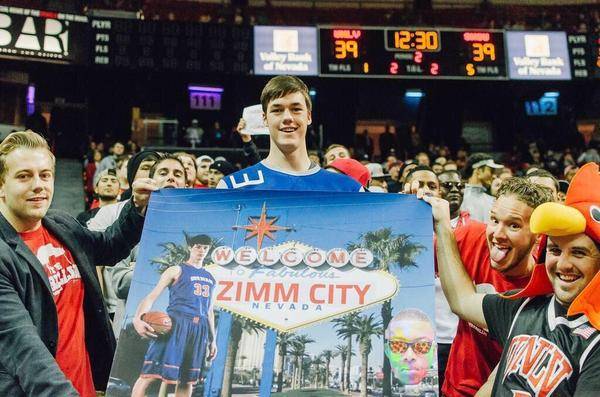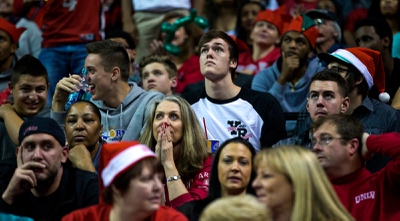
Stephen Zimmerman's Twitter
Bishop Gorman senior Stephen Zimmerman stands with a poster of himself in the Rebellion student section Sunday, Nov. 16, 2014, during his official visit to UNLV.
Sunday, Jan. 11, 2015 | 2 a.m.
More Coverage
High school basketball player Isaac Hamilton had his college choices narrowed down to UCLA, UTEP and UNLV.
On Nov. 16, 2012, the five-star guard from California went on national television and picked UTEP, a huge get for the Miners and coach Tim Floyd, who as an assistant at UTEP coached Hamilton’s uncle more than 30 years ago. Shortly after the announcement, Hamilton signed a national letter of intent.
But eight months later, Hamilton changed his mind and wanted to enroll at a school closer to home. His signature on the letter of intent forced him to sit out a season. He’s now a sophomore at UCLA in his first year of college eligibility, having lost the first year because of the contract he signed with UTEP.
Such a bind, and the one-sidedness of letters of intent, are why another five-star player the Rebels are recruiting, Bishop Gorman senior center Stephen Zimmerman, won’t sign one.
“It had a big impact,” Lori Zimmerman, Stephen’s mother, said of Hamilton’s ordeal. “We were already discussing not signing, and that became our example of, ‘Look what happens. This is why we’re not doing it.’ ”
Hamilton’s story isn’t unique. Every season, players try to get out of signed letters of intent, and schools won’t let them.
Although most schools generally grant players a release when there’s a coaching change — that’s how freshman Jordan Cornish landed at UNLV after signing with Tennessee — programs occasionally invite bad press trying to make recruits honor letters of intent. Squabbling often results when a player signs early with a smaller program then tries to get out of the deal when bigger programs take interest.
The Zimmermans took those problems off the table entirely by announcing in the fall that Stephen would sign a scholarship agreement when he announces his decision but not a letter of intent.
A scholarship agreement guarantees a player a scholarship but allows him to change his mind before the season and go to another program. On the other hand, once a letter of intent is signed, a school must agree to release a player from the agreement. If it doesn’t and the player chooses another school anyway, he has to sit out at least a year at the other program.
“The more I educated myself about the letter of intent and discussed it with Stephen, it didn’t seem worth it,” said Lori Zimmerman, who handles press for her son. “I would see kids that tried to decommit, and it was a huge hassle.”
Zimmerman isn’t the first player to refuse to sign a letter of intent during the recruiting process. But it’s rare, and he might be the most high-profile example. Universities hold the upper hand and can pressure players to sign the letters by warning that their spots could go to other recruits unless they sign.
Ranked No. 10 in the class of 2015 by Rivals.com, Zimmerman’s remaining suitors — UNLV, Kansas, Arizona, Kentucky and UCLA — are willing to save a spot for the 7-footer, even if it means he could change his mind and enroll elsewhere in August, leaving the program in a lurch.
“I need to trust them, and in the same way, they need to trust us,” Lori Zimmerman said. “So if our relationship isn’t strong enough that they trust Stephen is going to honor his commitment without signing, then it’s not a good situation.”
At least one coach wasn’t happy with the family’s decision and during an in-home visit with the Zimmermans, brought an example of an national letter of intent filled out, Lori Zimmerman said.
NCAA rules don’t allow coaches to comment on specific recruits, but speaking in general about an athlete not signing, UNLV coach Dave Rice said he doesn’t have a problem going after a players in those situations if the relationship is solid.
“Recruiting is about trust,” Rice said. “I want guys who want to be part of our program, so I trust when there’s a commitment that’s made, a player is going to honor that commitment. Just like when I offer a scholarship and the player chooses to take it, they can trust me that the scholarship is going to be there for them.”
When Hamilton decided he wanted to stay in California, citing a sick grandmother, Floyd refused to release him.
“He had two choices: one, not to sign the letter of intent, or two, to file an appeal,” Floyd told the El Paso Times in July 2013. “I’m not releasing him. We have made our schedule based on having Isaac. People have bought season tickets based on our having Isaac. It’s too late. He can appeal, and we’ll wait to see what happens. If he is allowed out, we might as well not even have letters of intent.”
Floyd’s comments drew negative reactions across the country. With the public increasingly rallying against the NCAA, many wondered why the system all but forces players, many of whom are minors, to sign binding legal documents.
Stephen Zimmerman’s decision isn’t expected until at least March, after the state high school basketball tournament. His choice could affect future high-profile recruits. Since he chose door No. 1, how many will follow?
Taylor Bern can be reached at 702-948-7844 or [email protected]. Follow Taylor on Twitter at twitter.com/taylorbern.


Join the Discussion:
Check this out for a full explanation of our conversion to the LiveFyre commenting system and instructions on how to sign up for an account.
Full comments policy